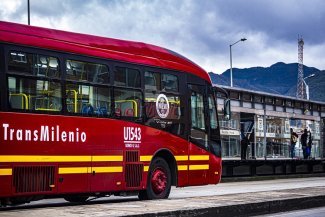Pictured here in May 2019, biologist Stoyan Beshkov opposes the Kresna Gorge motorway project and fears it will have a devastating environmental impact on the region’s biodiversity.
From Valentin Stoichkov’s terrace, the views over the Pirin Mountains are breathtaking. The deputy mayor of the small town of Kresna, in south-western Bulgaria, has built an extension to his family’s modest dacha (summer home) in the foothills of this national park, a UNESCO (United Nations Educational, Scientific and Cultural Organization) World Heritage Site since 1983. He now offers accommodation to those travelling here to enjoy the great outdoors.
“This region is very well preserved; the air here is very clean. But as you can see behind me, a massive disaster took place here, when 1500 hectares of forest went up in smoke.” The broad-shouldered local politician points to a band of scorched earth snaking across the hills close to his home. This terrible fire made the headlines across the Bulgarian media in August 2017. Notably, the flames appear to have closely followed the planned course of a future section of the Sofia-Thessaloniki motorway.
This infrastructure project has been stirring controversy in the Kresna region for over 20 years. It is through here that the Orient/East-Med Trans-European Corridor, as defined by the European Commission, linking northern Germany to Greece, is set to pass. European taxpayers have footed approximately €620 million of the project’s total bill, estimated at €755 million.
Its construction remains as controversial as ever owing to the Bulgarian government’s decision to chart the north-south section of the motorway across the Kresna Gorge, one of the country’s most important nature reserves.
In the other direction, from Thessaloniki to Sofia, the road is likely to pass close to Valentin Stoichkov’s land.
The Bulgarian authorities have effectively ruled out all alternative routes, dismissing the possibilities of digging a long tunnel or building a two-way motorway to the east of the gorge. It is a decision condemned by Fidanka McGrath of the NGO Bankwatch Network: “The Bulgarian government has failed to provide convincing and solid evidence to back its decision. It claims that splitting the motorway would be more cost-effective, but provides no cost-benefit analysis. This option would deprive Kresna’s inhabitants of a local road into neighbouring towns, the city of Blagoevgrad, as well as towards the north and Sofia. There would be no alternative route when the road is blocked, as seen in the past.”
A road into deeper inequalities
The Bulgarian economy has never really taken off since the country joined the European Union (EU) in 2007. It is still the poorest and, above all, the most inegalitarian country in the EU. Corruption scandals regularly tarnish the already shaky reputation of a political class comprised of former communist era apparatchiks who have greatly benefitted from the privatisation of the economy. The citizens’ uprising that lasted several months in 2013 now feels like a distant memory. The fight against corruption in Bulgaria is an area where substantial progress needs to be made, according to a 2017 report by the European Commission.
Many of the locals opposed to the construction of the motorway in the Kresna Gorge believe this project is a perfect illustration of the misuse of public funds. The Bulgarian contractors’ alleged inability to build a tunnel has been used to justify the decision to simply widen the existing road across the gorge, which would allow Bulgaria to meet the 2023 completion deadline and to secure EU funding.
The links between building and public works companies and the ruling right to far-right coalition headed by Boyko Borisov are a sensitive issue in Bulgaria.
Last October, the mutilated body of journalist Victoria Marinova was found in the north of the country, shortly after she had spoken out on television about investigations into a construction firm notoriously linked to the prime minister. Mired in threats, fake news and censorship, Bulgaria ranks lowest among EU countries in Reporters Without Borders’ 2019 World Press Freedom Index.
The country’s ecosystems are also paying a heavy price. This is evidenced by the disappearance, over an eight-year period, of almost a fifth of the 420 bird species recorded in the region. Between the rapid urbanisation of the Black Sea coast and the development of Europe’s cheapest ski resort in the nearby Pirin National Park, the Kresna reserve stands out as a jewel to be preserved.
Biodiversity of European importance
Stoyan Beshkov has one hope: to preserve the gorge. This biologist from the National Museum of Natural History in Sofia painstakingly inspects every shrub and plant in search of Lepidoptera. “There are more butterfly species per square mile than in the whole of Great Britain!” he says. “The gorge is not only important for Bulgaria; it is of European importance. Here, we are at the northern limit of the distribution of many species, and even orders, whilst for other species, it marks the southern fringe. Different climates, the continental and Mediterranean, meet here.”
Classed as a Natura 2000 site (a pan-EU network of core breeding and resting sites for rare and threatened species), this 18-kilometre-long gorge carved out by the Struma River is home to a remarkably vast concentration of biodiversity. The more than 3,500 species found here include at least 92 protected ones. The gorge is an important migratory corridor for mammals and birds from Africa.
Although Beshkov’s colleagues note that bears are still occasionally seen on the road, countless species have already been affected by the increase in traffic. “You no longer see animals that have been run over on the road because they’re almost all dead,” says the lepidopterist bitterly, fearing the worst for the years to come.
To stop the building of the motorway, a coalition of NGOs has relaunched the Save Kresna campaign. More than 200,000 signatures have been collected as part of a petition submitted to the European Commission. Beshkov is adamant: “Only one or two per cent of the population refused to sign. The locals are opposed to the building of the motorway across the gorge.” The Bankwatch Network does not lay responsibility at the door of the Bulgarian authorities alone. “The Commission is the guardian of the EU’s environmental law,” explains McGrath, “But by failing to ensure the protection of nature in the Kresna Gorge it is not acting as a proper guardian of EU treaties and laws.”
“There is no future for us”
On the edge of the road on which hundreds of heavy goods vehicles race towards the Greek border, Ivan Dimov dips wetsuits into soapy water. This keen sportsman has spent the last ten years working as a rafting guide in the Kresna Gorge, an activity that has become increasingly popular in recent years. “The river here is probably the best in the country for rafting, with excellent rapids and good waves,” he explains. “But a one-way motorway system would really complicate matters. What will happen when there’s an accident? A detour of at least 40 minutes will have to be made!”
Ivan points to a group of young men who have come from Plovdiv to discover the river. “After rafting, they will go to a restaurant near Kresna, they will enjoy the hot springs, and then spend the night in a village. Rafting provides a livelihood for the locals here. If the motorway is built across the gorge, everything would change within two years, it would be a disaster.” The young thrill-seekers went to eat nearby, at Ivo’s place. The sad-eyed man, head of the family, has taken over his father’s small hotel. He also sells sheep’s milk yogurt and locally sourced natural honey. “The parking areas they will install along the motorway will only cater for big companies like Shell and OMV, there will be no future for us. I will probably go to London, where all of my friends have already moved. Although I’d really like to stay. I’m at home here,” he says.
Ivo has taken out three bank loans in 30 years. Most of the small businesses in the region have shut down. The never-ending economic transition in the country’s villages and smaller towns is a heart-breaking sight. Streets are lined with empty houses falling into ruin, silently turning to dust. Bulgaria’s population has dropped from almost nine million in 1989 to just seven million, 30 years on.
Bulgarians are leaving the country, and the population is decreasing like nowhere else in the world. The most pessimistic forecasts estimate that the population could fall to as low as 4.5 million by 2050.
This would be a fatal blow for Kresna’s small businesses, fears local elected representative Valentin Stoichkov. But he still hopes a solution will be found. Dangerous and overcrowded, the current highway makes life impossible for Kresna’s residents and fatal accidents are a regular occurrence. “Sadly, as is often the case with these kinds of projects, things are not in our hands and there are not only benefits,” he admits. “But the worst thing would be to lose the gorge.”










